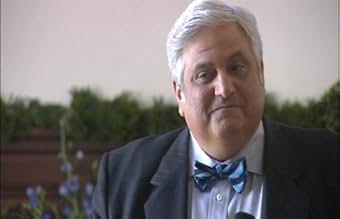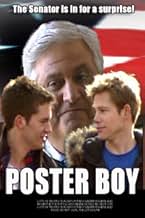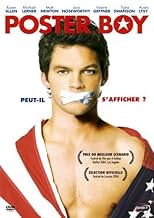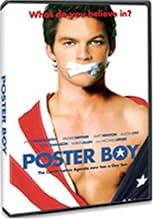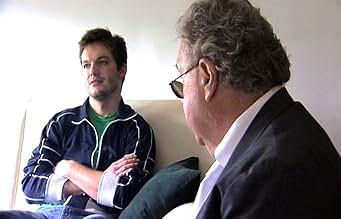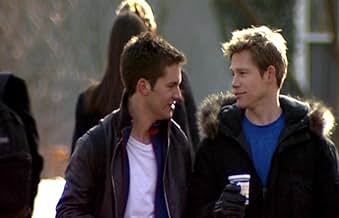Adicionar um enredo no seu idiomaWith the help of a hot, slightly older new acquaintence (Noseworthy), the closeted son (Newton) of a conservative U.S. Senator (Lerner) puts a shocking spin on his dad's re-election campaign... Ler tudoWith the help of a hot, slightly older new acquaintence (Noseworthy), the closeted son (Newton) of a conservative U.S. Senator (Lerner) puts a shocking spin on his dad's re-election campaign.With the help of a hot, slightly older new acquaintence (Noseworthy), the closeted son (Newton) of a conservative U.S. Senator (Lerner) puts a shocking spin on his dad's re-election campaign.
- Direção
- Roteiristas
- Artistas
- Prêmios
- 1 vitória e 2 indicações no total
- Skip Franklin
- (as Ian Kessler)
- Direção
- Roteiristas
- Elenco e equipe completos
- Produção, bilheteria e muito mais no IMDbPro
Avaliações em destaque
The best aspect of the film is the acting. The core cast are all fantastic. What didn't work so well for me was the cinematography, editing and the general low budget approach. The cinematography is mostly (or maybe all) hand-held, with a lot of shaky cam shots and a lot of blurriness. The film is loaded with overexposed shots and a dominance of white. While that may have been so for metaphorical reasons, it's not the most pleasant thing to watch aesthetically if it's relentless--and that's also not the best way to get the metaphorical aspects across. The editing is frequently frenetic. In combination with the locations, sets and general lack of music, Poster Boy has the feel of a 100-thousand dollar art house drama made by a director who is way too obsessed with The Blair Witch Project.
Fortunately, the story is better than that would suggest, although it's not perfect. This would have been far more on-target and controversial 15 years ago (given our present knowledge and overall lack of reaction to the sexuality of some political offspring), but it's still engaging enough, especially given the performances, and at any rate, it deals with important issues that are still far from resolved in our culture.
Matt Newton plays Henry Kray, the college boy son of Jack Kray, an outspoken conservative senator facing a re-election vote. The son is gay and very much in the closet -- though apparently quite sexually active; while the father is a "family values" candidate with a history of particularly harsh and homophobic stands on various issues. The clueless Jack bullies Henry into being active in his re-election campaign as a way of reaching out to younger voters.
This is a great start; especially if you add in a plot twist wherein Henry unknowingly has a one-night stand with Anthony, a gay rights activist who has a particularly strong dislike for Senator Jack, his politics and his political party. Henry finds himself caught between a father who wishes to exploit his son's youthful and apparently straight-arrow image and a lover who hopes to out him in a cheap attempt at embarrassing the father. This is a nice set up for a potentially complex drama, maybe even an intriguing thriller.
Making an admirable effort to establish an Altmanesque feel to the film, director Tucker finds his attempts at realism at odds with the script that seems contrived and phony as the screenwriters fumble the material in infuriatingly inept ways. For one thing, as played with a perpetual snarl by Michael Lerner, Sen. Jack Kray isn't just a conservative, the story goes out of its way to make sure we know that he is (and by extension, all conservatives are) controlling and hypocritical and poor at parenting to boot. He isn't just a conservative, he is "the Nazi of North Carolina" whose campaign seemingly is financed by the tobacco industry. Gay issues aside, it is not surprising that Henry has great animosity toward his dad. And that is the problem: The film quells part of its strongest source of drama from scene one by obliterating even the slightest suggestion of there being a genuine loving bond between father and son. Indeed, the entire film is told via flashbacks as Henry spills his guts to a reporter in what seems to be a spiteful attempt to get back at his father.
The film would be much more powerful had Henry been torn between two loves; one, his familial love of his father, and the other, his sexual attraction to his lover. The film would be so much more compelling (and believable) if Senator Kray were to be basically a good man with extreme beliefs or if Henry were to be a true believer in his father's politics, who had to face how it conflicts with the reality of his own sexuality. Or what if Sen. Kray were a liberal whose politically correct rhetoric masks a homophobic mind? And though Anthony and his fellow activists aren't shown in a particularly flattering light either, the story overly stacks the deck to the left by making Senator Kray an oh-so obvious right-wing villain in a tired attempt to make clear the film's already obvious left-leaning bias. The result is weak propaganda and even weaker drama.
Worse, all the cheap political shots detract from the film's strongest relationship, between Newton's Henry and Jack Noseworthy's Anthony. Both actors give fine performances, helped considerably by the fact they are given the most realistic characters to play. Newton captures the anxiety of Henry, a guy who just wants to live his life out of the public eye, but finds the comfort that comes from living in the closet comes at a high price. Noseworthy makes credible a character who can't quite separate his sexuality from his politics, which, ironically, is the problem with the film itself. The film's most potent message would have been in exploring this love story rather than in focusing on all the yammering political noise that surrounds these two men.
Heavy-handed though it is, the script actually has a few good points to make. If only screenwriters Ryan Shiraki and Lecia Rosenthal put as much thought into telling a story as making a statement, especially when they're preaching to the choir. As it is, the narrative is more like a series of contrivances meant to move the characters toward that Big Moment rather than plausible events arising from believable circumstances. Luckily, the movie is buoyed somewhat by fairly solid acting. Karen Allen is a welcome presence as the senator's chain-smoking, heavy drinking wife, even if her Southern accent is a tad bit overdone (conversely, Lerner's Southern accent is almost nonexistent). Director and co-editor Zak Tucker packs the movie with lots of style—from quick cuts to split screens to moody gels and filters—making his movie nearly unwatchable in the process.
"Poster Boy" also has continuity errors galore. Cigarettes are a particular problem, be it a reporter lighting a half-smoked cigarette in the opening scene, only to be shown seconds later with a fresh one dangling from his lips unlit; or Allen smoking a newly lit cigarette, then shown lighting it a quick cut later. There's also the extra so nice we have to see her passing Newton and Noseworthy twice in the same scene (made worse by the fact that Newton calls attention to her the first time around), and Lerner is shown getting into a limo with his hair a mousy brown when in the rest of the movie it's white. Other distractions: How do Noseworthy and Geffner—one unemployed, the other a bookstore clerk making $7 an hour—afford a chauffeured Town Car? And why the gratuitous female nudity in a movie that features gay men with hyperactive sex lives? Sadly, the two male leads are only fleetingly shown in their skivvies.
For all its problems, "Poster Boy" isn't awful, but it made its statements so loudly and so often that I found myself tuning them out, wondering instead whether anyone in wardrobe was going to rustle up something else for Ms. Allen to wear besides that lavender suit.
Some other users have commented on the movie not being multi dimensional, but I think that the way that the characters reacted are pretty realistic, and most people (generally) are multi dimensional but may only show one side of their selves for one reason or another, and don't forget that this movie is focused from the point of view of Henry Kray. It also has many plot twists, and though it has be commented upon that it is too predictable, I thought nothing of the sort. The characters are oddly unpredictable, and are like multi layered onions, many people might just look it and observe that is it just another gay movie, but it is not, it is so much more than that.
The story itself is rather simple. Through the gimmick of a confession to a reporter we meet handsome young Henry Kray (the talented Matt Newton), gay since early teens but electing to keep his private life a secret, who is the son of Senator Jack Kray (Michael Lerner) and his lovely but docile wife Eunice (the fine Karen Allen). It seems that six months prior to the time we are invited into the conversation Henry met Anthony (hunky Jack Noseworthy) whose roommate is HIV positive Izzie (Valerie Geffner). Henry and Anthony have a one-night stand the day before Jack Kray is to give a speech for re-election at Henry's college. The Senator accidentally hits Izzie with his car and Eunice insists Izzie stay with them in their suite where the two women bond. Meanwhile Henry's night with Anthony makes him late for the speech, but a talk to Henry from Jack before the speech telling him what to say (Jack is the best father, loves family values, etc) sticks in Henry's throat and soon after he obeys his father's wishes for the speech introduction, Henry turns to his table partner Anthony and the two kiss openly as the Senator is addressing the crowd - all caught by the media of course.
How this moment of honesty alters the lives of everyone around is the crux of the ending. Not a bad tale, but the camera work is so patchy and disconcertingly disconnected that it defies the viewer to keep the storyline straight. But if the viewer can keep up visually, the performances by the cast are well worth attention. There is some very fine talent on the screen of this B movie! Grady Harp
Você sabia?
- Erros de gravaçãoWhen Henry and Anthony are walking through the campus, Henry points out one of the girls walking ahead of them. Seconds later, you can clearly see her as an extra in the background.
- Citações
Henry Kray: [to Jack] What am I part of, Jack? An issue? Don't you get it? Issues are what they use to divide us. Sexual orientation, race, gender... All issues that don't actually pertain to anyone except those being cut out and thrown away by the issue. Does it really matter to some farmer in Kansas whether or not two men get married in Vermont? But see, they need us to choose sides. They create these issues for us to cling to, to grasp at. You know they separate us into these divisions: Black, White, Gay, Straight, Rich, Poor. Blame it Christian, Liberal, Democrat, Conservative. Split. Different. Opposed. How can a cause be just if it puts people against each other?
- ConexõesReferences O Mágico de Oz (1939)
Principais escolhas
- How long is Poster Boy?Fornecido pela Alexa
Detalhes
- Data de lançamento
- País de origem
- Central de atendimento oficial
- Idioma
- Também conhecido como
- Exposed
- Locações de filme
- Empresa de produção
- Consulte mais créditos da empresa na IMDbPro
Bilheteria
- Faturamento bruto nos EUA e Canadá
- US$ 62.062
- Fim de semana de estreia nos EUA e Canadá
- US$ 3.806
- 13 de ago. de 2006
- Faturamento bruto mundial
- US$ 62.062


